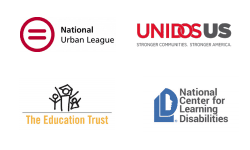COVID-19 Response
Early childhood education is facing an existential crisis in light of the COVID-19 pandemic. Last April, 60% of child care providers, who are disproportionately women of color, closed; and by July, 40% of programs reported that they are certain they would close permanently without public funding. Half of these programs have had to substantially raise their tuition rates for families, who are themselves struggling financially during this crisis. Only 6% of child care businesses received Paycheck Protection Program loans, leaving the vast majority without financial support. As of December 2020, 1 in 4 child care centers and 1 in 3 family child care homes reported that if their enrollment does not increase and they do not receive sufficient funding, they will close within three months; and most child care programs owned by people of color – 51% – reported that they expect to close within three months. Significant funding is urgently required to stabilize ECE. We recommend the following actions:
We recommend that the Biden administration actively work with Congress to take the following legislative actions to stabilize ECE budgets and increase educational equity for young children most impacted by the pandemic:
- Appropriate an additional $40 billion to a stabilization fund for the child care industry. Appropriate an additional $15 billion for the states through the Child Care and Development Block Grant (CCDBG) as outlined in the Child Care Is Essential Act, the updated Health and Economic Recovery Omnibus Emergency Solutions (HEROES) Act, and the President-elect’s American Rescue Plan. The December 2020 COVID-19 relief package contains $10 billion in CCDBG funds for this purpose, which falls far short of the amount necessary for supporting ECE providers and the families they serve.
- Include the ECE sector in all applicable recovery programs as they are funded through various channels and will likely not all be addressed through one recovery program. Because ECE is provided in a wide variety of settings, all providers – including those in family child care homes – should be eligible for such recovery programs.
- Automatically enroll providers in mortgage forbearance (with no interest, penalty or extension), rent deferrals/grants, and utility and insurance payment support throughout the public health crisis and through at least 60 days after the end of the crisis.
- Allow any federal funding that states can use for locally determined urgent needs to be used for supporting child care providers.
Federal relief packages for states and school districts should set aside money specifically for serving children with disabilities, including those receiving services under the Individuals with Disabilities Education Act (IDEA), Section 619 of Part B, and Part C. This funding should be explicitly used to address the likely under-identification of children with disabilities from birth to kindergarten and insufficient delivery of services to them during the pandemic, and should be used during school shutdowns and as traditional in-person special education and related services begin to resume (for instance, in January 2021 through August 2021). States must use a portion of this federal funding to support the following:
- Child Find activities for children who are potentially eligible for services under IDEA Part B, Section 619, or Part C;
- Staffing for increased service delivery to provide compensatory special education and related services, including increased capacity for an extended school year (ESY);
- Professional development for all elementary school teachers, including general education teachers, on identifying disabilities and using referral processes, including training on culturally and linguistically competent practices and family engagement;
- Funding for IDEA Part B, Section 619, and Part C technical assistance (for instance, through the Early Childhood Technical Assistance Center) to document and build upon lessons learned during the pandemic, and about the effects of the current crisis, in order to inform future responses to crises, including:
- Publishing the state’s monthly referral, evaluation, and service delivery data throughout the pandemic, disaggregated by race/ethnicity, dual language learner status, limited English proficiency or home language status, income level, foster care status, and geographic location; including:
- Rate of service delivery for families already receiving services; rate of service delivery for families receiving services for the first time; and percentage of families who began receiving services for the first time out of all those found eligible for services;
- Wait times between referral and evaluation, and evaluation and service delivery.
- Publishing challenges and successes of delivering Part B, Section 619, and Part C services during the pandemic and recommendations for the immediate future and for future crises and gathering feedback from the following people in the state:
- Part C and Part B, Section 619 professionals regarding their professional experiences throughout the pandemic, including challenges, successes, feedback on state guidance, and recommendations; and including feedback specific to serving families of color, low- income families, families of dual language learners, families with home languages other than English, children in foster care, and families across various geographical regions within the state.
- Families receiving Part C and Part B, Section 619, services during the pandemic, including families of color, low-income families, families of dual language learners, families with home languages other than English, foster families, and families in urban and rural areas.
BEYOND THESE EFFORTS TO ADDRESS THE COVID-19 RESPONSE, THE BIDEN ADMINISTRATION’S FIRST BUDGET PROPOSAL PRESENTS AN OPPORTUNITY TO ADVANCE EARLY LEARNING EQUITY IN THE FOLLOWING AREAS LONG AFTER THE PANDEMIC

 January 15, 2021 by
January 15, 2021 by 


